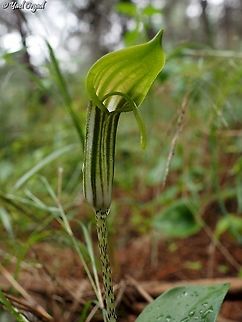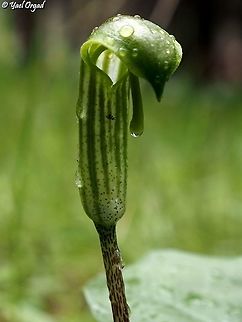
Appearance
''Arisarum vulgare'' reaches on average 10–30 centimetres of height. The leaves of this geophyte plant are basal only, wide, ovate to arrow-shaped, with a petiole 12–15 centimetres long.The stems are erect and unbranched, usually mottled and grow directly from the underground rhizome. A single leaflike bract forms a purplish-brown or olive green striped tube about 5 inches long, with an open upper part helmet or hood-shaped curved forward. It encloses a fleshy greenish clublike spike bent forward, protruding from the tube and bearing at the bottom minute purple violet flowers.
The 20 male flowers are located above the four to six female, with sterile flowers completely missing. The flowering period extends from October through May. The sexes are united in the same individual plant. Pollination is granted by insects . The fruits are greenish berries of about 1 centimetre long.

Naming
The main described subspecies are the following:⤷ ''Arisarum vulgare'' O.Targ.Tozz. subsp. ''vulgare
⤷ ''Arisarum vulgare'' O.Targ.Tozz. subsp. ''simorrhinum'' Maire & Weiller
In ''Arisarum vulgare'' subsp. ''simorrhinum'' the flower stem is much shorter than the petioles. Bract and spadix are erect. The latter is thickened at the tip.
Distribution
This plant native to Mediterranean region of southern Europe and northern Africa, east to the Caucasus, and west to the Canary Islands, the Azores and Madeira.Habitat
''Arisarum vulgare'' prefers grassy fields and rocky scrubland, forests and wasteland, mainly in shady and cool places and in moist soils, at an altitude of 0–800 metres above sea level.References:
Some text fragments are auto parsed from Wikipedia.